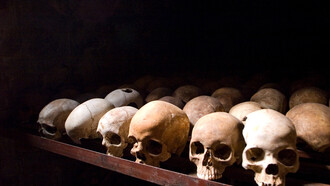"I want to make perfectly clear to you that we are now talking to our enemies. They are our enemies and we are theirs. And it's not to be taken for granted that they are with us here. I appreciate their courage in coming here and would like you to ask them questions."
The speaker is MP Hilik Bar, who I'll talk about later. Sitting behind the table were a number of men, Palestinian Arabs, at least one of whom is a member of the central council of the PLO (Palestine Liberation Organization) and close to the president of the Palestinian Authority, Abu Mazen. The man in question, Mohammad Al-Madany, was invited to Jerusalem by the Labor party in order to present the Palestinian take on the solution to the conflict. It may well be that this was courageous. But I have to say that if it were the other way around, my guess is that the level of security for Jewish Israelis going to Ramallah to present their take of a future peace settlement would be vastly greater. I believe that a Palestinian who happens into the territory of the state of Israel would feel much more secure than a Jew who accidentally happens into the territory of the Palestinian Authority. Either way - both guests and hostess showed courage in making this meeting.
Generally in a conflict, there are two sides. Some theorists will claim that an internal conflict could also arise there within one of the sides. But the basis is always two sides. Also in the well known Israeli-Palestinian conflict there are two sides. And in this unique case, which affects not only the Middle East but the whole world order, there are internal conflicts on each side.
I wanted to bring to light an aspect of this conflict which has not been very visible in the last few years, an aspect that is not contentious, rather strives in all honesty to keep communication open and in the end to achieve a peace treaty between the two sides.
I visited Israel's parliament, the Knesset, and met with Hilik Bar, the general secretary of the Labor party and vice chair of the Knesset to have a frank talk in order to understand what motivates a young politician to try and solve the ailments of Israeli society on the one hand and the conflict between Israelis and Palestinians on the other. It was Hilik, who, among other things, as chairman of the lobby for the resolution of the Israeli-Palestinian conflict, invited Al-Madani and his colleagues to the meeting. Al-Madani is the head of the committee for interaction with Israeli society.
Hilik Bar was born in the city of Safed in the north of Israel. Safed is considered one of the holy cities in Judaism and has undergone many changes over the years leading up to the establishment of the state of Israel. Its physical distance from the center of the country puts it in the category of "peripheral" city, and this was the environment Hilik grew up in. Today he is married, lives in Jerusalem and is the father of a toddler that has already visited his dad in the workplace and even preempted his seat.
"My initial motivation for entering politics began when I was a child and came to visit friends in the center of the country and the in Jerusalem. It was then that I discovered that there was another "country" in the state of Israel. I realized that there was a gap between the periphery and the center and I wanted to change this" -explains Hilik and continues- "I asked my father, who was at that time deputy mayor of Safed and secretary of the workers' council, how do you make change. And he answered succinctly, go into politics."
As someone who grew up observant in a messianic-religious town, it's easy to see why he chose to move to Jerusalem and why he feels as if he's always lived there. As one in a family of six children, Hilik knows well what growing up with financial hardship and what social inequalities mean. When he entered politics he did it in fact from social impetus. But very soon, as the head of the student faction that represented the Labor party at the Hebrew University, he understood that there was another issue that he had to deal with in order to bring essential change to Israeli society, and that was the ongoing conflict between the state of Israel and the Palestinians.
Hilik understood that there was another people that needed its rights and its own state and that it was necessary to stop the violent conflict and also to promote coexistence with the Arabs of Israel. This said, Hilik declares openly, much to one's surprise for a politician who is honest and compassionate, that he too is not interested in the Palestinians -
"I am in favor absolute separation between us and the Palestinians. I want two states with clear boundaries. The Arabs of Israel will be offered national service or the army."
I should emphasize at this point that Hilik's approach is identical to that of many and not necessarily the Israeli left. I too, and I'll grant that I don't belong to any political persuasion, would like to see an end to the conflict not out of love for the other side but more because of disgust with its violent means which has cost the lives of thousands of Jews and Israelis. On the other side of the equation, there is the issue of Israeli security that co-opts so much of the material and physical resources of the state's budget and is probably the cause most responsible for Israel's social polarization, a polarization that brought out hundreds of thousands to demonstrate for affordable housing and reduction of the cost of living, albeit without success to date, but from the point of view of an evolving process, it is possible that Israel may yet experience more violent responses to the social situation.
MP Hilik Bar opines that a solution to the conflict will in fact lead to a different middle east. He notes that the Arab League (the international organization including all the Arab states) opens the door for the state of Israel to fifty-six Muslim states, including Iran. In spite of the fact that the Palestinians are difficult partners to the solution of the conflict, it is still the case that Abu Mazen is willing to give up territory and pay the price to achieve a peace treaty.
Regarding Iran, MP Bar backs Israeli Prime Minister Binyamin Netanyahu's position and supports him 100% in his demand to stop their race to acquire an atom bomb. Bar hasn't the slightest thing against the Iranian people.
"I encountered an enlightened and intelligent people in the many meetings I had with Iranians across Europe," Bar says, adding only that he rejects only the regime.
Just to make clear for the readers the distinctions between Netanyahu's administration and the Labor party, let me emphasize that Bar represents the social democratic party which advocates for more state responsibility and involvement in all aspects of social life, and not allow the economics of a free and capitalist market to make the gaps between the center and the periphery of the country extreme.
The state of Israel is spectacular and wonderful phenomenon that arose from the ashes of the victims of the holocaust and has in sixty five years set precedents unmatched anywhere in the world, of a country with a strong economy, a strong military, a strong hi-tech sector and a strong agriculture, and above all an authentic democracy. This is the message that MP Bar wants readers to get and he notes, in reference to democracy, that only in the state of Israel does freedom of expression reach such absurd extremes, as in the case of the Israeli Arab MP who took part in a violent flotilla against the state of Israel on the side of terrorist activists in the guise of freedom fighters, and she still serves in her position as MP without having been arrested or imprisoned.
"I'm proud to be an Israeli but I'd like to improve and fix more and especially to achieve peace with the Palestinians to be an even prouder Israeli."
So the opposition, according to Bar, is the alternative to the coalition that makes up the government of Israel today, although the burden of proof rests more on the Palestinians and their leadership. We need two courageous leaders, like Begin and Sadat, like Rabin and Hussein, only two courageous leaders can make peace.
In the folklore of Safed there are many stories, some of which deal with stubbornness of its residents. In the meeting that took place between the Israelis and the Palestinians, one of the senior people who accompanied Mohammad Al-Madany noted that if Hilik Bar and Al-Madany were to negotiate directly with each other then a peace treaty would certainly be signed quickly.
Hilik after all has political aspirations, naturally, to reach the highest place in politics. What's interesting is that it's not only Hilik Bar who is a native of Safed. So is Abu Mazen. The question then is how might two stubborn headed people like these find common ground if the mandate to negotiate a peace treaty to bring an end to the Israeli-Palestinian conflict, were in their hands.
From what I learned, two negatives make a positive.















